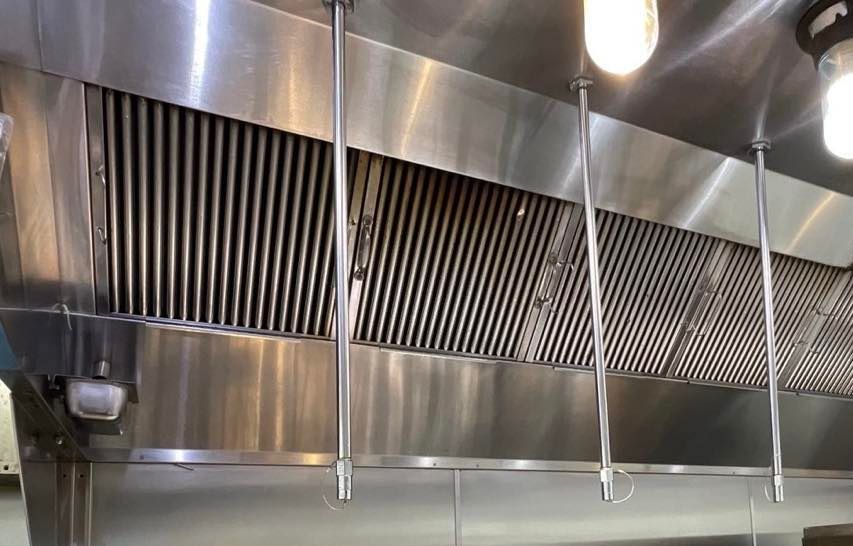How Often Should Commercial Kitchen Hoods Be Cleaned?
Your Guide For How Frequently To Clean Your Kitchen Hood

Follow Local Regulations and Codes
The first thing to consider is your local health department and fire safety codes. In many jurisdictions, commercial kitchens must follow specific regulations that dictate how often kitchen hoods should be cleaned. For example, the National Fire Protection Association (NFPA) recommends the following:
- NFPA 96: The standard for ventilation control and fire protection of commercial cooking operations requires that kitchen hoods be cleaned regularly to prevent the buildup of flammable grease deposits.
- Class I Hoods (charbroilers, fryers, etc.): Typically require cleaning every 3 to 6 months.
- Class II Hoods (less greasy equipment): May need cleaning every 6 to 12 months.
However, always check with local authorities for specific cleaning requirements, as they can vary from state to state or even city to city.
Consider the Type of Food You Serve
The frequency of hood cleaning also depends on what kind of food your kitchen prepares. If you're frying, grilling, or charbroiling foods, your kitchen will produce a lot more grease than a kitchen that mainly prepares baked goods or salads.
- High-grease cooking operations (e.g., frying, grilling, sautéing): These kitchens require more frequent cleaning, typically every 1 to 3 months.
- Lower grease cooking operations (e.g., baking, steaming, boiling): Kitchens with less greasy cooking methods may be able to go 3 to 6 months between cleanings.
The more grease your kitchen produces, the more often you’ll need to have your hoods, ducts, and fans cleaned to reduce the risk of grease fires and maintain proper ventilation.
Monitor the Volume of Cooking
The amount of cooking you do also plays a significant role in determining cleaning frequency. A kitchen that serves hundreds of meals daily will accumulate grease and dirt much faster than one that only operates a few hours a day or on weekends.
- High-volume kitchens (e.g., fast food restaurants, large hotels, banquet halls): These kitchens should have their hoods cleaned more frequently—every 3 months or even more often if necessary.
- Low-volume kitchens (e.g., small cafes, occasional catering services): These kitchens may require cleaning every 6 months or longer.
- A high-volume operation will have to deal with grease buildup much more quickly, so schedule regular inspections to ensure your system stays clean and functional.
Signs That Your Kitchen Hood Needs Cleaning
While following a routine cleaning schedule is important, you should also watch for signs that indicate your kitchen hoods need attention. These include:
- Unusual smells or smoke: If you notice smoke or odors lingering in the kitchen, it could be a sign that grease is accumulating and the ventilation system is not working efficiently.
- Grease buildup: If you can visibly see grease on the filters, hoods, or ducts, it’s time for a cleaning.
- Excessive heat: If your kitchen feels hotter than usual, it could mean that your ventilation system isn’t working at full capacity.
- Reduced airflow: If the kitchen feels stuffy or you notice that the fan isn't pulling air effectively, this could signal a clogged duct or exhaust system.
Why Regular Hood Cleaning Matters
Regular commercial kitchen hood cleaning is essential for a variety of reasons:
- Fire Safety: One of the most critical reasons to keep your kitchen hood clean is to prevent grease fires. Grease and oil can easily ignite when exposed to high heat, and a buildup in your exhaust system is a fire hazard.
- Health and Hygiene: A greasy hood can spread contaminants throughout the kitchen, affecting the cleanliness of your kitchen and food safety.
- Improved Efficiency: A clean ventilation system works more effectively, helping to maintain optimal airflow and reducing the risk of system failure.
- Regulatory Compliance: As mentioned, failure to maintain a clean exhaust system can result in fines, penalties, or even closure of your kitchen.
A Proactive Approach
So, how often should your commercial kitchen hoods be cleaned? While the general recommendation is every 3 to 6 months, the exact frequency will depend on your specific operation, the type of food you serve, and your local regulations.
It’s important to work with a professional hood cleaning company that understands these variables and can provide a customized cleaning schedule that ensures your kitchen remains safe, compliant, and efficient.
In addition to regular cleaning, keep an eye on grease buildup, airflow, and overall ventilation performance. If you’re unsure of when your system was last cleaned or if you’ve noticed any of the signs mentioned above, don’t hesitate to schedule a cleaning today. Your kitchen staff, your customers, and your business will all benefit from a well-maintained exhaust system.
If you're ready to take the next step in keeping your kitchen safe and compliant, contact us today for a professional hood cleaning service tailored to your needs!
Book a Service Today
We will get back to you as soon as possible
Please try again later
Questions?
We are available 24/7 via social media, email or phone.
All Rights Reserved | Thurmond Legacy Ventures LLC
